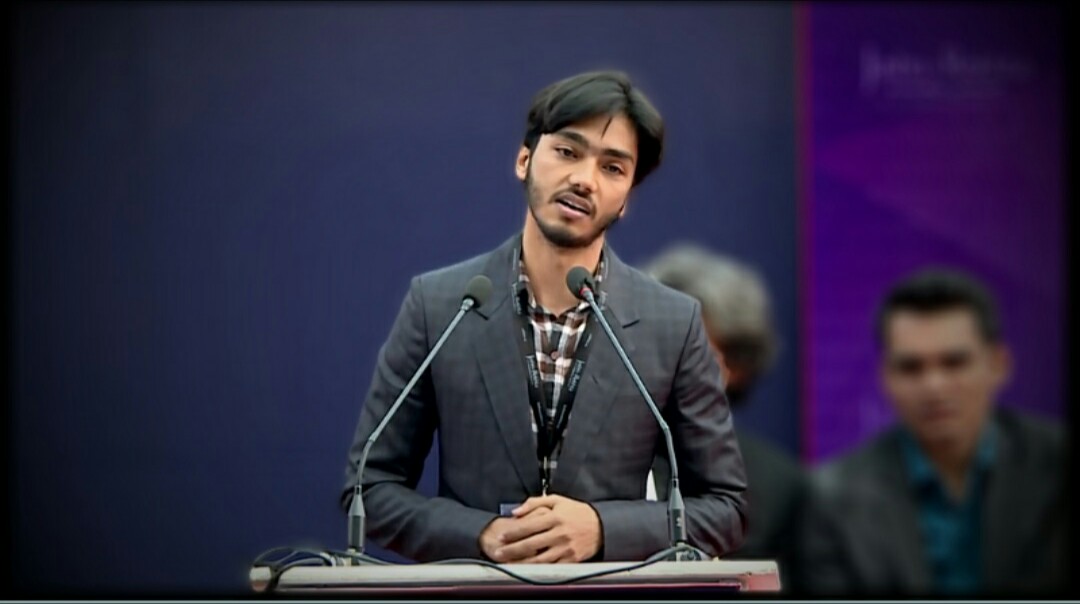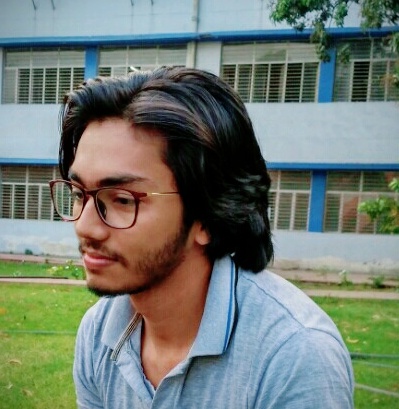Give the familiarity of languages to a child and watch him fly with colours of success, and that’s what exactly was done with the young poet, Azhar Nawaz, who creates beautiful linguistic castles with those languages, particularly Urdu. Born in Anjan Shaheed, a small hamlet of Azamgarh in Uttar Pradesh, Nawaz’s formal knowledge of Arabic and Urdu comes from Maktab which he attended till class five. He did graduation and post graduation in English Literature from Jamia Millia Islamia. But the real credit can only be given to his immediate family. His father is a retired Urdu teacher, brother is an associate professor of English, sister being a teacher of English in an intermediate college and mother used to teach Arabic in a Maktab. And so his love for Urdu, English and Arabic was inevitable.
Even though his medium wasn’t English, yet he did remarkably well in his Masters in English Literature. When asked about his fascination with the language, he goes on to talk about his brother and sister, with whom and along with his parents; he shares his passion of teaching.
 Jamia broadened the wings of this poet by giving him more audience to grow and fellow poets to get inspired by being in the national capital. He got a chance to recite his poetry in some major events of the country like Jashn –e-Rekhta, Naye Purane Charagh, Shab-e- Shiraaz, to name a few. His Ghazals have been published in leading journals and websites like Milli Ittehad, Rekhta.org and Kaafiyana.
Jamia broadened the wings of this poet by giving him more audience to grow and fellow poets to get inspired by being in the national capital. He got a chance to recite his poetry in some major events of the country like Jashn –e-Rekhta, Naye Purane Charagh, Shab-e- Shiraaz, to name a few. His Ghazals have been published in leading journals and websites like Milli Ittehad, Rekhta.org and Kaafiyana.
 When asked about his reading habit, Nawaz quotes T. S. Eliot, who believed that tradition and individual talent both go hand in hand; your individual talent can flourish only when you follow the rich tradition of a form. The classics as well as the contemporaries both matter. He loves to read both the old and the new poets. He indulged himself into reading books starting with classical poets, Meer, Ghalib, Momin, Daagh and Faiz. He further adds that from them you actually learn the basics. As a child, he had access to the renowned poets of Urdu and their poetry collections like that of Meer, Ghalib, Zauq, Momin, Daagh, Shefta, Akbar, Iqbal,Faiz, Faraz and many others. His father would read out couplets from their collection concluding to a development of a taste for poetry in his early years. His poet brother and father have been a constant inspiration.
When asked about his reading habit, Nawaz quotes T. S. Eliot, who believed that tradition and individual talent both go hand in hand; your individual talent can flourish only when you follow the rich tradition of a form. The classics as well as the contemporaries both matter. He loves to read both the old and the new poets. He indulged himself into reading books starting with classical poets, Meer, Ghalib, Momin, Daagh and Faiz. He further adds that from them you actually learn the basics. As a child, he had access to the renowned poets of Urdu and their poetry collections like that of Meer, Ghalib, Zauq, Momin, Daagh, Shefta, Akbar, Iqbal,Faiz, Faraz and many others. His father would read out couplets from their collection concluding to a development of a taste for poetry in his early years. His poet brother and father have been a constant inspiration.
Very soon, hopefully, we would see his collection of Ghazals published, as he intends.
Here’s a short and inspiring interview with the young and talented poet by Saniya Irfan of Aapka Times:
- What poetry is for you? Define poetry in your terms in any language you feel that can live up to your expectations of beauty in poetry.
First of all poetry is very special to me. I believe that it is a gift from God. It is capable of influencing people. The language is the same but when it finds treatment in poetry it gets a special power to transform people, to change their heart and to make them think on certain issues. It’s a special talent to work with words in a magical way. I believe that poetry is magic. It can bring about a change into the society. If it is able to move people even for a fraction of a second, it can actually lead them on to the path of piety and righteousness. The beauty of poetry is a manifestation of the beauty of soul. If you are willing to lend an ear to poetry it will talk to you in the most soothing ways. The disorder in the outside world is put into order and poetry teaches you how to do it as it jostles with the disturbances outside as well as inside.
- Do you love Urdu, English and Hindi equally? If not, then why?
There are no boundaries in literature. I don’t think language should be a barrier. I love poetry for its exquisite beauty and appeal irrespective of the language in which it is written. Kamla Das in her poem ‘Introduction’ says that “The language I use becomes mine”. I also go by this belief and feel that as long as I am comfortable with a language at the level of speaking, reading and writing, I would not like to compare one with the other.
- Do you write about your collected emotions in tranquillity or when you are sentimentally high?
This is part of Wordsworth’s definition that you mentioned: ‘Emotions recollected in tranquillity’. The first part of the definition is ‘Poetry is the spontaneous overflow of powerful feelings’. So the thing is that, something strikes you and you feel deep for the moment and you allow that feeling to remain in your heart for a period of time and then somewhere in the subconscious mind you wait for suitable words to give expression to that particular emotion. I do agree with this part of the definition. Because instantly you don’t write it down. Some thought or sentiment is there lying in your mind for a period of time and when you find suitable words you express it. And you don’t know how and where those words come from. This is why Nissim Ezekiel, one of the Indian English poets, says in his poem ‘Poet Lover and Bird Watcher’ that “Good poets wait for words”. And I also believe that one should wait for appropriate words to come.
- Is your poetry subjective?
As far as the form Ghazal is concerned, it is very difficult to give a definite reply to such a question because at times it could be purely subjective and at times it could be objective. Ghazal at the level of technique and at the level of thought is a very subtle art form and this is the beauty of it. Like it has been the tradition, sometimes I explore my personal feelings and at other times I look at world or the realities around and try to identify with them. But the thing is that Ghazal or any other art form is marked by the peculiar form of expression where you make the personal universal. That is what defines or characterizes poetry.
- How did you feel when you recited your poetry for the very first time?
It was a great experience. I still recall the day when I composed my first couplet and shared it with my elder brother. He was quite surprised and was very happy at the same time. He urged me to take up this seriously and practice more and read more. He refined my skills. That was my starting point from where I moved ahead.
- Who is your favourite Urdu poet and why?
Among the old poets, Ghalib holds a fascination and charm for me both at the level of craftsmanship and thought. The way he uses a particular word and packs it with multiple layers of meaning is his peculiar skill as a poet. Among the contemporary poets I admire Ahmad Faraz. His poetry develops an instant connection with the readers and his lines remain etched in your memory for long.
- Are you interested for any workshop for the students of Jamia so that you can share your skills?
Yes. That would be a good way to interact with the lovers of poetry. In fact by sharing my experience of writing with them, I would not only be helping them with certain skills but also learn from them in the form of feedback and responses.
- What role did Jamia play for you?
Coming to Jamia has been enriching in many ways. Interacting with professors and learning from them has been a great experience. Professor Shahpar Rasool and Dr. Khalid Mubashhir from the dept. of Urdu have been very kind and co-operative. In my department I came across certain teachers who have been quite an inspiration to me. Especially, I would like to mention Professor Anisur Rehman, a poet, critic and an excellent teacher, who always encouraged and appreciated my orientation toward poetry. Through him I learnt how to sharpen and chisel my poetic skills. I would also like to mention Dr. Meher Fatima, who listened to my poetry with interest and advised me to keep it up.
- What are your plans for future?
I have joined Aligarh Muslim University as a PhD scholar in English. After obtaining my degree I plan to go for academics.
His poetries and their recitation videos can be reached at the following links:
https://www.rekhta.org/poets/azhar-nawaz
#ShareYourStory and Become Campus Celebrity
Aapka Times brings an opportunity for you all to be the celebrity of your college.Share your extraordinary achievement and get featured at Aapka Times.If you are distinguished among your friends Share your story or nominate your friend. We would give you recognition by publishing your story.If you think you have the ability to be one then try your luck by filling this form: Campus Celebrity form
